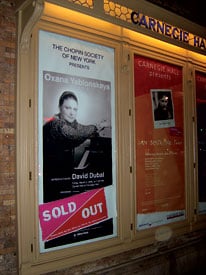Oxana Yablonskaya's Musical Journey
 Oxana Yablonskaya sells out Carnegie's Zankel Hall |
Now a longtime resident of New York, Yablonskaya chuckles at the irony of how fate has played out. Getting to this point, though, was no laughing matter. After high-profile finishes at three major competitions Second Grand Prix and Gold Medal at the Long-Thibaud in 1963, First Prize at the Rio de Janeiro in 1965, and Second Prize at the Vienna Beethoven in 1969 Yablonskaya became known as one of the world's great virtuosi. Composers dedicated new works to her. She played a prominent role at the gala concert that celebrated Dmitri Shostakovich's 65th birthday.
Yet restrictions imposed by the Soviet system led her to apply for a visa to emigrate to the United States in 1975. Predictably, she was stripped quickly of her privileges and positions, including her post as assistant to professor Tatyana Nikolayeva at the Moscow Conservatory, and denied access not just to performing but also to playing the piano at all. Two years would pass before an international effort, spearheaded by an alliance of political leaders, writers, actors, and musicians, opened the door for her to relocate to America. (Her struggles against the KGB, along with a whimsical but informative account of building a career over the barrier of having a limited physical reach on the keyboard, are recounted in her upcoming autobiography and tutorial, My Life with Small Hands.)
Naturally, even a world-class artist is bound to encounter unexpected cultural differences when introduced to life outside the world she had come to know. For example, Yablonskaya was surprised when she let it be known, shortly after settling in New York, that she wanted to return to teaching. "I was 17, in my first year of college, when I began teaching at my school in Moscow on the recommendation by Anaida Sumbatyan," she says. "In Russia, the greatest performers are all teachers as well. They feel that they have a duty to give knowledge to younger people. Oistrakh, Kogan, Rostropovich: When you asked what they did, they never said, 'I'm a performer.' They said, 'I'm a professor at Moscow Conservatory.'
"But when I came to America," she continues, "Bill Judd, my wonderful manager, couldn't believe it when I said I wanted to teach again. Performers in the United States did not teach, however I firmly believe it is an honorable position. I began instructing students who had come to Juilliard from Russia. And now I have my wish." Yablonskaya has been on the Piano Faculty of The Juilliard School of Music in New York since 1983.
Yablonskaya encountered countless other differences, great and small, between what she had known in Russia and what America had to offer, not the least of them involving pianos. With mainly Eastern European instruments at venues and only a few world-class grand pianos at the Moscow Conservatory, she had to wait until her arrival in the U.S. before she could experience all that Yamaha has to offer. Her initial encounter was at the Newport Music Festival, and though she was affiliated with another manufacturer at the time, she was more than open to becoming a Yamaha artist when the invitation was extended several years later.
"The people at Yamaha were very nice and polite," she explains. "But more important, I love their pianos. When my son [cellist/conductor Dmitry Yablonsky] and I play every summer at the Puigcerda Festival in the Pyrenees in Spain, there is always a wonderful Yamaha there. And when I was in Hamamatsu, doing master classes, I had a very, very good Yamaha in my room. Of course, the personality of the performer is most important, but the Yamaha piano always allows the performer to express that, warmly and deeply."
Her love of performing and teaching are often brought together at Yamaha Artist Services, Inc. in New York, where Yablonskaya has held master classes and concerts, as well as recitals with students, including a recent Mozart Concerto for Two Pianos, K. 365, with an especially gifted nine-year-old Canadian girl named Alice Burla. "When I have a very young student, I ask from them exactly what I would ask from an adult," she insists. "That is how I was taught at the Central School of Music in Moscow: I studied for ten years with Anaida Sumbatyan, a wonderful teacher, who didn't change my hand positions or anything like that. She gave me only musical support because she knew that technically every student plays differently. To me, the biggest compliment a teacher can receive is when a student performs and everybody thinks it's natural. It's like being a painter: Nobody wants to see the foundation of the painting. You only want to see results."
Such was also the case years ago in the Young Pioneers days, though today, music offers a more humane and aesthetic path toward excellence. As for Braginsky, who has enlisted Yablonskaya to serve for the finals on this year's Piano-e-Competition, his appreciation for her has only grown with time.
"Yes, Oxana was my Young Pioneer leader," he says, with affection. "But I'm not afraid of her anymore!"
For more information about Yamaha Pianos, write Yamaha Corporation of America, Piano Division, P.O. Box 6600, Buena Park, CA 90622-6600; email infostation@yamaha.com; or telephone (714) 522-9011.
 |
| © 2010 Yamaha Corporation of America. All rights reserved. |
